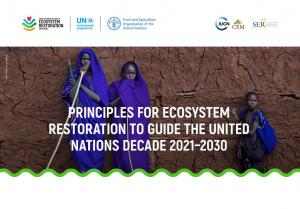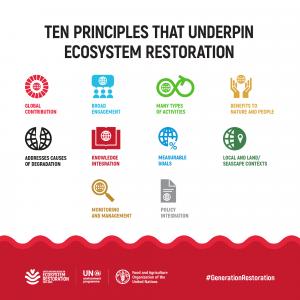
Ten Principles Underpin Good Ecosystem Restoration throughout the United Nations Decade 2021-2030
UNITED STATES, September 21, 2021 /EINPresswire.com/ -- JOINT PRESS RELEASE
In Marseille, France, the Food and Agriculture Organization of the United Nations (FAO), leading the UN Decade on Ecosystem Restoration’s Best Practices Task Force, the International Union for Conservation of Nature's Commission on Ecosystem Management (IUCN CEM) and the Society for Ecological Restoration (SER) presented ten principles to underpin ecosystem restoration throughout the UN Decade on Ecosystem Restoration 2021-2030 during a live, in-person side event held on the past 7 September at the IUCN World Conservation Congress.
To support the implementation of the UN Decade on Ecosystem Restoration and its Strategy, these ten principles fulfil two needs: first, the need for a shared vision of ecosystem restoration, and second, the need for guidance to maximize net gain for biodiversity, ecosystem health and integrity, and human health and well-being from all types of restorative projects, programmes and initiatives.
“"The principles for ecosystem restoration will be a critical tool to guide the implementation of the UN Decade 2021-2030 and to maximize the sustainable production of goods and services” said Christophe Besacier, co-leader of the Best Practices Task Force and Coordinator of the Forest and Landscape Restoration Mechanism at FAO.
“To fulfil the ambitions of the UN Decade, the next ten years must see a massive acceleration in the pace of global restoration activity,” said Jim Hallett, Vice Chair of SER. “That’s why it is so important to have strong principles, sound science, engaged communities, and a common understanding of the wide array of restorative activities that can heal the planet.”
“Repairing degraded ecosystems is a complex challenge that requires integration of ecological, socio-economic, and cultural perspectives. The principles bring these perspectives together to achieve the highest degree of recovery possible for nature and people” added Angela Andrade, Chair of IUCN’s CEM.
In order to ensure an inclusive and legitimate process to develop principles for ecosystem restoration, the FAO-led Best Practices Task Force, IUCN CEM and SER engaged in a multi-stage process, starting with a synthesis of published principles for distinct types of restorative activities. The synthesis was then used in an expert consultation process during the 3rd Global Forum on Ecological Restoration. After that, a small group of Forum participants from leading global organizations, including the Center for International Forestry Research (CIFOR) and World Agroforestry (ICRAF), EcoHealth Network, and the World Wide Fund For Nature (WWF), together with FAO, IUCN CEM and SER as lead organizations, revised the synthesis to identify priority themes and to inform an initial, draft set of principles. The draft principles were subjected to an open global consultation survey via the UN Decade website, obtaining 338 responses from 57 countries and 243 organizations.
Feedback from the consultation informed the development of the final set of principles which are applicable across all sectors, biomes and regions. The ten principles state that good ecosystem restoration: 1) contributes to global policy frameworks; 2) promotes fair and inclusive engagement; 3) includes a continuum of restorative activities; 4) aims at the highest recovery possible to benefit nature and people; 5) addresses the causes of degradation; 6) incorporates all types of knowledge; 7) sets ecological, cultural and socio-economic goals; 8) tailors activities to local and land/seascape contexts; 9) measures results and adapts actions; and 10) integrates policies and measures for lasting impacts (see full text in the publication).
“Restoration is something that everyone, everywhere can engage in – it is inherently cooperative, solutions-oriented, and hopeful. The collaborative spirit through which these UN Decade principles were developed, and the diverse and inclusive nature of the principles, mirror the collaborative, equitable, and inclusive spirit in which the UN Decade is being implemented. The principles lay the foundation for working together to effectively address both the climate and biodiversity crises and thus to benefit nature and people” said Bethanie Walder, Executive Director of SER.
To foster wide dissemination and adoption of the principles, these will be translated into all UN languages. Likewise, UNEP released a webstory to convey the key messages of the principles for a non-technical audience. The principles will also allow the Best Practices Task Force to define criteria for qualifying good restoration practices, promoting those that are well aligned with them. Finally, the Task Force expects to continue the partnership established with IUCN CEM and SER to pursue the development of Standards of Practice for ecosystem restoration as an important tool to provide practical guidance for implementing restoration. Click here to download the publication.
- ENDS -
About the FAO-led Best Practices Task Force
To boost actions for the implementation of the UN Decade on Ecosystem Restoration, an FAO-led Best Practices Task Force was established to prepare guiding principles and enhance knowledge dissemination and capacity development efforts over the next ten years. With more than 100 members from 55 leading global organizations, the Task Force is a broad network of experts from all ecosystems that welcomes new members every day.
About the Society for Ecological Restoration
The Society for Ecological Restoration (SER) advances the science, practice and policy of ecological restoration to sustain biodiversity, improve resilience in a changing climate, and re-establish an ecologically healthy relationship between nature and culture. An international non-profit organization with more than 4,000 members in more than 85 countries, SER actively promotes participatory, knowledge-based approaches to restoration.
About IUCN Commission on Ecosystem Management
The IUCN Commission on Ecosystem Management’s (CEM) is a network of professionals and experts. Its Mission is to develop and share expert guidance on ecosystem-based approaches to management and use of natural and modified ecosystems to achieve both biodiversity conservation and sustainable development.
Contacts
FAO-led Best Practices Task Force
Christophe Besacier (Rome)
Forestry Officer, Forest and Landscape Restoration Mechanism, Forestry Division
Christophe.Besacier@fao.org
Vera Boerger (Rome)
Senior Land and Water Officer, Land and Water Division
Vera.Boerger@fao.org
IUCN CEM
Cara Nelson (Montana)
Lead, Ecosystem Restoration Thematic Group
cara.nelson@mso.umt.edu
SER
Bethanie Walder (Washington DC)
Executive Director
bethanie@ser.org
Bethanie Walder
Society for Ecological Restoration
email us here
EIN Presswire does not exercise editorial control over third-party content provided, uploaded, published, or distributed by users of EIN Presswire. We are a distributor, not a publisher, of 3rd party content. Such content may contain the views, opinions, statements, offers, and other material of the respective users, suppliers, participants, or authors.



